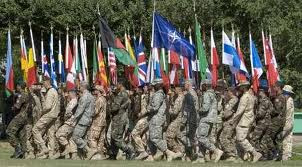While nobody wants to admit that we are moving towards a form of world government, it is evident that there is a constant movement towards world governance, i.e., efforts by the international community to find solutions to global problems. The hardest part of governance is enforcement. At the international level it is even more difficult because it depends on decisions by international organizations and the voluntary contribution of troops. We have now had about half a century of UN peacekeeping experience and now there are currently 15 peacekeeping operations all over the world and have been over 50 from the UN's beginning. Peacekeeping missions are something like a boy with his finger in the hole in the dike, holding back a flood. They rarely are decisive in ending conflict and merely suspend it. Now NATO--or some other regional organizations like the OAS in Haiti or the OAU in Somalia--interventions have been more vigorous, in Bosnia, Kosovo and now Afghanistan. They can actually lead to a new status quo with hopes of solutions to conflict. But it also means a willingness to engage in armed conflict to defeat one side or another in a conflict.
There are lots of drawbacks to both peacekeeping and NATO interventions. Countries must volunteer troops or other assets, and they usually joint with certain "caveats" that prevent them from engaging fully in all aspects of conflict. NATO countries often commit themselves to a tentative engagement and struggle with public opinion that is often pacifistic and tentative. We are seeing in Afghanistan, for example the withdrawal of certain countries from the field or to forms of support that remove their troops from the battlefield such as the training and advisory missions (which are also essential, but with less risk).
However, I would put forward that gradually but clearly a form of international defense force, loosely organized, is taking shape. My most significant experience is with the NATO and ISAF effort in Afghanistan. I find it quite amazing that armed forces from almost fifty countries manage to coordinate and work together in as complicated a task as security. I have worked with officers from a number of NATO countries who work side by side with American counterparts. What strikes me as most interesting is that soldiers from different countries, who often speak different languages, share a common military culture, use the same professional vocabulary and the same procedures for conducting military operations. It took me quite a bit of time as a civilian to adapt to military langauge and acronyms. However, foreign officers are fully steeped in the stuff. And even more interesting is how well this is a coaliton of warriors who work together and respect each other's national differences. The normal military comraderie is made stronger by the multicultural nature of the effort.
What is also clear is that this culture is largely American-made, the result of the undeniable fact of American military predominance in the world. Countries are not "doing us a favor" by joining us in Afghanistan. There is a common understanding of the stakes there, perhaps more among the military than their civilian masters or their publics. Ultimately, however, these officers could not participate in coalition warfare without a basic guarantee of political and diplomatic commitment at the level of the NATO political leadership.
I see this development as progressive although slow to evolve, but inevitable nonetheless. The international community can no longer afford to have terrorism, piracy and rogue regimes and non-state actors without some force to count on to bring enforcement of international law and norms. This is an extremely hopeful trend.
Sunday, February 13, 2011
Subscribe to:
Post Comments (Atom)



.bmp)
No comments:
Post a Comment